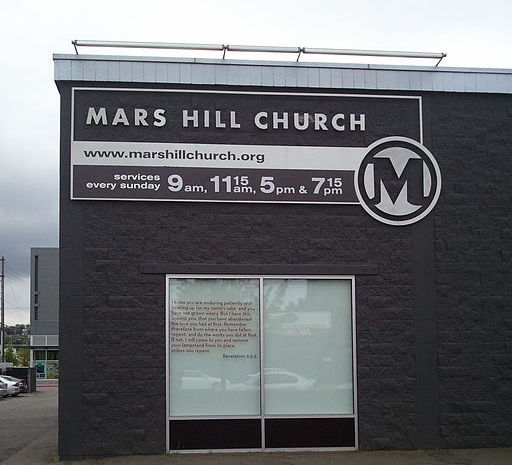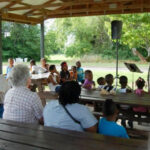Four years ago, Mars Hill Church in Seattle seemed too big to fail.
Just 17 years old, the church was drawing an average weekly attendance of 12,329 to 15 locations. In fiscal year 2013 alone, Mars Hill baptized more than 1,000 people, planted 53 churches in India, and supported 20 church planters and evangelists in Ethiopia. It released 50 new worship songs, gave away more than 3,000 Bibles in the United States and Ethiopia, and took in nearly $25 million in tithes and offerings.
Then, in a few breathtaking months, the whole thing collapsed. Founder and lead pastor Mark Driscoll’s bent toward the provocative, which was part of his draw, increasingly came under fire, fanned by a series of controversies.
Driscoll announced he was taking a break in August 2014, then resigned less than two months later. By the end of October, lead preaching pastor Dave Bruskas announced the whole thing was shutting down.
“We don’t have anything in church history this apocalyptic, as far as a behemoth like Mars Hill—not only a city but national and international voice—collapsing in a two-month period,” said Taproot Church pastor Dan Braga, who watched the whole thing from the adjacent suburb of Burien.
Mars Hill’s final announcement was optimistic: “With her final breath, Mars Hill gave birth to 11 newly independent churches where, by God’s grace, the gospel will continue to be preached, his name will be glorified, and thousands will be saved by Jesus.”
Technically, that was true. But the legacy of Mars Hill is a lot more complicated.
Tidal Wave of Hurt
The collapse of Mars Hill released a tidal wave of hurt, disillusioned people. Many quit Mars Hill; some quit church or Christianity altogether. Hundreds limped into other area churches, asking about church bylaws and pastoral pay structures before even introducing themselves.
“We had some serious trust issues,” said Neil Huck, who started attending Mars Hill in 2004. He spent a decade growing from “a baby Christian to a less baby Christian” under Driscoll’s leadership.
“It’s like your dad left, and your family is broken,” he said. “There is nothing healthy about that. You get through it, and your faith strengthens, and good has come from it. But it wasn’t healthy.”
Exodus from Ground Zero
Ground zero was the Mars Hill Bellevue campus, where Driscoll preached live and in person. Within weeks, the congregation of 3,000 plummeted to 700.
The church stayed in its building, joined by fellow Mars Hill campus Sammamish, and replanted as Doxa church on January 1, 2015. Their new pastor was Jeff Vanderstelt, who had been leading his own church plant about an hour south of the Bellevue campus.
After Bellevue called him, he asked every church leader he could find—and he found more than 70 both inside and outside his church—if the move was a wise one. They overwhelmingly told him to go.
“The experience of stepping in to care for the people that remained was better than I could have ever imagined,” Vanderstelt said.
Those who stayed were “eager to move forward but also knew they needed healing,” he said. “I don’t know if that’s because so many had left, so those who remained had a deep conviction about being the church. In their words, ‘[The church] wasn’t all about one man. It was about Jesus and his mission.’”
Still, they were hurting, and Vanderstelt spent a year sitting with church members, listening to questions and trying to help them make sense of what had happened. He also published his salary and documented clear guidelines on his submission to elders for any spiritual discipline.
“The biggest fear was that I was going to walk away,” he said. “The thing that hurt the most, that they couldn’t believe, was that Mark would leave them. The feeling that they lost their pastor was a hard blow.”
That’s because “Mark called us his kids,” said Huck, for whom Driscoll was a father figure. “He up and left his kids. That’s the hard part we’re still dealing with. I don’t need a public apology, but it would be nice to be acknowledged. It’s like your dad left and started a new family, and you’re here with your brothers and sisters. And you’re just confused.”
About 16 miles away from Bellevue, the Mars Hill West Seattle campus took over its mortgage, renamed itself Trinity West Seattle, and continued as an independent congregation. Pastor David Fairchild watched his congregation drop from 800 to 400.
Members walked out in roughly three phases.
“The first wave [to leave] was younger folks, for whom this was their first real church,” Fairchild said. The second wave was those hurt or confused by the collapse; when their friends left, they had nothing to keep them around, he said.
Caleb Santana’s family was in that group. Santana plays bass guitar in the worship band; he “never considered” leaving. But his parents took his 16-year-old twin sisters to a local church with a functioning youth group after Trinity West Seattle’s dwindled to just a handful of participants.
The third, “which was unexpected and probably good,” took 18 months to leak out, Fairchild said. They were people driving in from a distance, passing local churches on the way. But with no megachurch to draw them in, they transitioned to closer congregations.
Swamped
Departing Mars Hill members hit local churches like a tsunami in the fall of 2014. The first Sunday after the closure was announced, Adam Sinnett’s 250-member Downtown Cornerstone Church saw nearly 100 visitors.
“I had never been asked by so many people I don’t know—before I even heard their name—about bylaws and pastoral pay structures in my life,” Sinnett said.
The next week, another crowd showed up, “but they weren’t the same people,” he said. Unmoored, former Mars Hill congregants were bouncing between visiting churches, staying home, and returning to their now-independent Mars Hill campuses.
Adding roughly 100 hurting people a week was tough on the “pretty fragile ecosystem” of Sinnett’s three-year-old church plant. “They needed help, and they weren’t in the best place to be recruited as leaders,” he said.
Sinnett and his co-planter David Parker worked overtime for months, fielding questions and absorbing confusion, anger, and hurt over endless cups of coffee. Last year, they installed two additional pastors and then both took a sabbatical, “feeling the weight of everything that had taken place surpassed the bounds of our relational and emotional capacity.”
Mars Hill members Ryan and Mandi Plasch arrived at Downtown Cornerstone in September 2014, the same time Driscoll was going on sabbatical. “We were sitting in the [Mars Hill] Sunday services, but we were no longer thinking about Jesus,” Mandi said. “We were thinking, Is there going to be something about the elders in this sermon?”
Finally, they couldn’t do it anymore. Leery of leadership, they picked Downtown Cornerstone because they knew Sinnett and trusted him. And yes, they asked about his philosophy on church planting, on multiple campuses, and on elder accountability. “You’re super gun-shy, because you don’t want to get into a situation again where you hear one thing from the pulpit but find out its being handled differently behind your back,” Mandi said.
Downtown Cornerstone moved into the role of a foster family, Sinnett said. “We knew the Lord was calling us to pause and care for our brothers and sisters who were hurting. We told them, ‘We know this is hard. We aren’t expecting anything from you. Whether you want to run with us for a month, or for ten years, that’s awesome. We just want you to feel grace and to feel loved.’”
Another 100 former Mars Hill congregants hit Taproot’s 200-member congregation that first Sunday after the collapse. In 2007, Braga had replanted the church, which had previously been pastored by Driscoll’s father-in-law. So the congregation was just seven years old when ex-congregants from Mars Hill doubled their numbers.
“After Mars Hill was gone, there were body parts everywhere, and we said, ‘Let’s do triage on every situation God brings us,’” Braga said. “You go to the worst ones first, make sure they stay alive, and keep moving through.”
“People were very disillusioned, very confused,” said Union Gospel Mission director of church engagement Chris Gough, who networks with dozens of Seattle-area pastors. “Yet it’s still a beautiful story because the local church caught many of these folks, walked with them, and cared for them. It seemed like the body of Christ transcended organizational ties and it was really about Jesus, not about anything else.”
Catching Congregants
Some, like the Plaschs, stayed for good. Others lingered for several months, healed up, and headed back to their Mars Hill campus. Huck and his wife, Ashley, spent time at both Downtown Cornerstone and Taproot before gingerly heading back to Trinity West Seattle.
“Walking through those doors again was really hard and really scary,” Huck said. He didn’t trust Fairchild, who hadn’t joined in publicly repudiating Driscoll and Mars Hill. And he wondered about the integrity of congregants who had chosen to stay.
They didn’t trust him, either. “Are we on the same team here?” Santana wondered of those who left or who were gleeful about the church’s demise. “Where’s any of the grace?”
It took some time to figure it out.
“You can’t hold them hostage,” Santana said of those who left. “You have to be okay with them leaving.”
“They really struggled,” Huck said of friends who stayed. “Everyone had that struggle—do we stay or do we go? . . . Some people were called to stay.”
Now they’re both at Trinity West Seattle, and Huck—who was baptized and married there—finally feels like he’s back home.
He’s not the only one giving it another go. “Almost every week I meet someone who says it’s the first time they’ve been back in the building in two and a half years,” Vanderstelt said.
No one took a survey, but by most estimates, about half of the former Mars Hill congregants stayed with their campus. Of those who left, most seem to have landed in different area churches. (Two were planted from the Bellevue exodus.)
A smaller number are so wary of organized religion that they’re trying to do it on their own, using Bible studies or sermon podcasts, Grace Church Seattle pastor Ryan Faust said.
But even though they’re wounded and unsettled, the Mars Hill diaspora has one enormous advantage: They’ve been well taught.
Taught Well
Although the ex-Mars Hill congregants needed time and attention, they weren’t entirely a burden, even at first.
“One of the things Mars Hill did well was they were serious about their faith,” Gough said. “People who migrated to other congregations remained serious about their faith, and brought with them that vibrancy.”
“Folks coming from Mars Hill have been well taught,” Sinnett said. “They have a basic understanding of the gospel and what it means to live on mission. They have a real heart for their city, and what it looks like for a husband to lead his family spiritually. A lot of those big rocks were in place.”
In addition, “you don’t have to persuade them that giving is a good, mature, and holy thing to do,” Braga said. “You aren’t fighting some funky theology. You’re fighting really good theology that went in weird ways in certain contexts.”
But Mars Hill congregants had also watched their pastor fall—dramatically and publicly—from favor. They experienced or read charges leveled against Driscoll from both current and former pastors that included lack of self-control, verbal aggression, arrogance, and anger. (The signers include Adam Sinnett, who was a Mars Hill staff pastor when he floated the idea of planting his own church in 2010. Mars Hill immediately fired him.)
Two years later, they watched Driscoll start another church, this time in Phoenix.
As a result, many of the former Mars Hill attendees were deeply suspicious of leadership. Faust met individually with people for hours, “to help them work through things and get to a point where they could trust me.”
Sinnett’s church plant was just three years old, and he didn’t have the resources to answer everyone’s questions, which “increased their suspicion of us unnecessarily. . . . We were still in our diapers as a church, and they were wondering why we didn’t have our polity all polished.”
Unpolished polity was not the only change that Mars Hill congregants had to deal with as they moved from being part of a megachurch to being part of a local church.
Braga recalls talking to one former Mars Hill member who now leads at Taproot. “He said that when they first got to Taproot, he was shocked to realize that if he didn’t give or serve here, the church dies. In a small church, he’s an integral part of the system.”
One unintentional and subtle message of Mars Hill was, “If you want to be part of what Jesus is doing in our city, then you should be here,” Sinnett said. “When we got out of that ethos and into the church-planting realm, I was blown away by the million things Jesus was doing in the city which were unnamed and unbranded but just as spectacular.”
Plasch agreed. “We felt many times we learned that Mars Hill was the only place that knew Jesus and the gospel, and as we started branching out we were like, ‘There are a lot of churches out here that love Jesus,’” she said. “Right off the bat, we really had our eyes opened to a vibrant community of people who love Jesus surrounding this city.”
Mars Hill Remnants
At Trinity West Seattle, the bleeding finally stopped sometime last fall, two years after Mars Hill announced it was closing. The church of 800 that dropped to 400 has crept back up to 550, Fairchild said.
“The first sermon series we picked was 1 Corinthians on purpose,” Fairchild said. “It was called ‘This Beautiful Mess’ because that’s where we were. . . . We were reading 1 Corinthians and saying, ‘There’s hope for us.’”
The church took a year to heal, intentionally staying away from vision casting, initiative creating, or hype. But they didn’t stay away from serving.
And in that, Trinity West Seattle found that being a local church “made us more nimble,” Fairchild said.
Instead of routing money and resources through central services, Trinity West Seattle has been able to dig right into its neighborhood. Community groups do after-school tutoring with at-risk kids, throw neighborhood parties, care for shut-ins, and hand out bottles of water during summer street fairs.
And not having “an 800-pound gorilla that overshadows every other small- to mid-size work” has been a good thing for networks, Fairchild said. Mars Hill “planted churches without working for a collective approach,” making it easy for smaller churches to feel hurt or passed over, he said.
“Since then, what’s happened is it’s forcing us to talk,” Fairchild said. “There’s no way to do mission work here without working with one another. There has been a necessary movement of repenting from our egos and an effort to say, ‘What would a focus on the kingdom look like?’”
“It has been really challenging and difficult and heartbreaking,” he said, “but also really gloriously beautiful because we work with churches now in ways that would not have been possible had we continued on as Mars Hill.”
At Doxa, where the numbers have climbed from 700 to 1,000 weekly attendees, Vanderstelt sees much the same thing. He started with being “a good spiritual father, caring for the family and building trust that I wasn’t going to leave.”
But at the same time, “we can’t make the church into a hospital,” he said. “We know God has saved us for good works, so we want to help people get healthy so they can walk in the fullness of that.”
The fruit of such reaching out—both giving and accepting help from other churches—has been “one of the beautiful benefits God has brought about through a lot of pain,” he said.
Moving On
“I meet with people all the time that have never heard of Mars Hill,” even those who are interested in faith, Sinnett said. “A few weeks ago, I sat down with a guy at Starbucks who just became a Christian, and he had never heard of Mars Hill.”
Among those who weren’t involved, the storm has essentially run its course.
“Very few people are talking about Mars Hill anymore,” Sinnett said. “That doesn’t mean there aren’t people still working through what happened in their own lives, but in general, Seattle is in a much better spot.”
In fact, Sinnett’s church is “in the best spot we’ve ever been,” he said. Downtown Cornerstone has grown to 700 and has two gatherings—“ironically enough, we meet in one of the old Mars Hill downtown campuses.”
But for Seattle-area pastors, a front-row seat to the implosion of Mars Hill taught lessons that will stick around for a while.
“I’m thankful for what I did learn from Driscoll, from reading a lot of his books and observing what he did right and wrong,” said Faust, who read Vintage Church before taking a congregation in Seattle. Watching Mars Hill collapse “was a holy moment for me. I modeled some of my leadership after him, and I had to look at areas of my life to see where I needed to repent and change my own leadership style.”
Particularly, “if you tell people they need to follow leadership, but don’t give good reasoning or explain things well, it makes people feel coerced.”
He’s far from alone. The introspection is especially sharp among Mars Hill’s former staff pastors.
“To a man, every one of them has struggled with what role of complicity they’ve had in the whole thing,” Fairchild said. “That has been very good for us. I have learned the difference between intent and impact—you can have good intentions, but that doesn’t always translate into helpful, gracious impact.”
The elders from Bellevue and Sammamish “truly repented of their participation in any of the sin,” Vanderstelt said. “There was a deep godly sorrow, a genuine repentance, a real desire to walk out the fruit of repentance.”
In the larger region, “every pastor is saying, ‘Noted,’” Sinnett said. “I am having regular conversations with guys who are saying, “If that’s what it means or takes—or who you become—to get that kind of church, I don’t want it. . . . It is a total [win] to be faithful to your wife, to love your kids, and to faithfully teach the Bible week after week and shepherd the flock among you.”
Former congregants are also still working through sometimes-painful lessons.
“There is so much I haven’t processed about Mars Hill yet,” Plasch said. “Much of what I learned there was wonderful. But there was an undercurrent or culture that seeped into the way you saw things, and that sometimes skewed the message a little.”
She’s also sifting through Driscoll’s black-and-white convictions, which “seemed to be communicated as law instead of a method to live out a biblical principle.”
Huck didn’t think he’d ever want to be a member of a church again. But recently he and Ashley have started serving in children’s ministry and hosting a community group in their home.
“I’m open to being a member again, where I wasn’t before,” he said. “With the fallout from Mark . . . I’ve been forced to think through what I’m being taught and if I agree with it. I’m grateful for places where it’s been okay for me to ask those questions and not be rebuked or shut down.”
Some marriages split; others grew stronger. “I’ve seen a lot of divorce,” Huck said. “But [Mars Hill’s troubles] helped [Ashley and me] come closer together because we had to figure out what was important to us.”
Softened by time, Mars Hill’s notoriety has even opened doors to evangelism.
“The drama of Mars Hill going away has allowed me to do a lot of living out my faith outside of my church,” Santana said. “By that I mean, meeting other fellow Christians and nonbelievers who are like, ‘Oh, that church was weird,’ and being able to say, ‘I went to that church. This is my story. This is why I am in Christ.’”
The dimming of the limelight has “allowed people to look past the [Mars Hill] name” and listen to what he has to say, Santana said.
Looking Forward
“More time and space and thought are going to produce a lot of lessons about who the church is and how the Spirit forms the church,” Braga said. “Mark changed the face of Christianity in the United States for this generation. Mars Hill helped popularize the neo-Calvinistic movement and complementarianism. In the early stages, it was a vital component of a return to conservative biblical family ideals.”
In the end, Mars Hill’s final announcement wasn’t optimistic enough. Counting previous campuses and new plants, the megachurch gave way to 15 new churches, not 11. And even though the collapse of Mars Hill left hundreds hurting and soured on the idea of belonging to a church, it also sparked a wave of healthy soul-searching and a realignment of churches with the gospel.
“The story is that Jesus’s church isn’t dependent on any one man,” Sinnett said. “It’s dependent on the risen Savior, who is a mighty God who grows and expands his kingdom through weakness and humility and the preaching of a crucified Savior. He isn’t hindered by a fallen pastor or an imperfect leader or imploded megachurches.”
Try Before You Buy: FREE Sample of TGC’s New Advent Devotional
 Choosing the right Advent daily devotional can be tough when there are so many options. We want to make it easier for you by giving you a FREE sample of TGC’s brand-new Advent devotional today.
Choosing the right Advent daily devotional can be tough when there are so many options. We want to make it easier for you by giving you a FREE sample of TGC’s brand-new Advent devotional today.
Unto Us is designed to help you ponder the many meanings of this season. Written by TGC staff, it offers daily Scripture readings, reflections, and questions to ponder. We’ll send you a free sample of the first five days so you can try it out before purchasing it for yourself or your church.

































